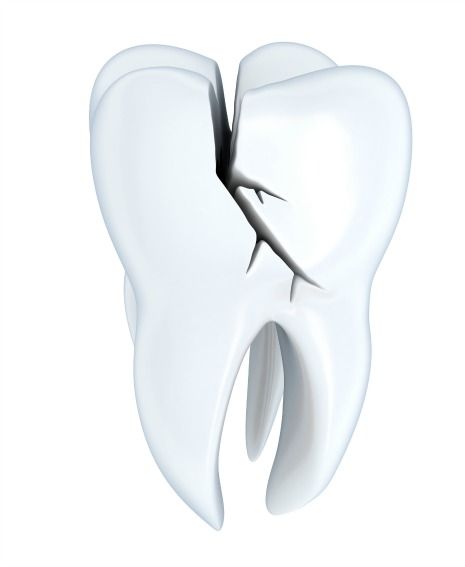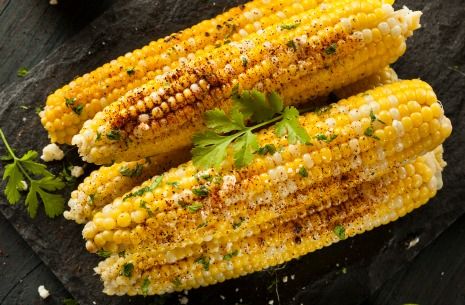Why Does Eating Roast Beef Make My Teeth Hurt
You care about your teeth and do your best to brush and floss daily, and visit your dentist every six months to help avoid
preventable dental problems.
What you may not know, is that some of your favorite foods can accidentally break or crack one of your teeth—and seemingly at the worst possible moment.
Chipping or breaking a tooth seems to happen when we least expect it. The sudden sound or feeling of a piece of your tooth loose inside your mouth is alarming.
What tooth did I break? Where? Did I break others? Swirling thoughts of potential pain quickly come to mind along with an emergency call to your dentist. Click to request an appointment or call (763) 586-9988.
Accidents happen.
 Oftentimes, if you crack a tooth, you won't be able to see how big or deep the crack runs. And not all cracked teeth will be symptomatic.
Oftentimes, if you crack a tooth, you won't be able to see how big or deep the crack runs. And not all cracked teeth will be symptomatic.
If you do have symptoms, especially when biting down, you may have what dentists refer to as cracked tooth syndrome.
Liken a cracked tooth to that of a hairline crack or rock chip on a windshield. Under the right conditions the crack will expand and/or contract and slowly grow in size until the windshield becomes a safety hazard and requires replacement. A cracked tooth is no different.
If symptoms to biting and temperatures increase, it is highly likely that your crack runs deep inside the tooth. A visit to your dentist will be necessary.
Your dentist will take a digital x ray, visually examine the tooth/teeth involved, and afterwards discuss your treatment options with you.
While there are many foods to steer clear of like jawbreakers, we've included a list below of the ten most popular offenders to watch out for.
10 tooth-busting foods to watch out for are:
- Popcorn
- Nuts
- Bones
- Hard Candy
- Ice
- Pits
- Nutritional Bars
- Hard Breads
- Corn on the Cob
- Jerky
Popcorn
 It's not the soft, fluffy popped kernels of this buttered snack that pose a threat to your dental health, it is the unpopped kernels.
It's not the soft, fluffy popped kernels of this buttered snack that pose a threat to your dental health, it is the unpopped kernels.
When you make or buy popcorn, there's always some kernels that remain unpopped and can be hard to see amidst the bigger pieces. If you unknowingly bite down hard on one, you'll immediately know it.
Dangers of eating unpopped kernels can crack the tooth or
bruise the tooth making it painful to bite down.
The kernel can even fracture part of your tooth or break apart a filling. When the tooth cracks or breaks apart we risk the nerve of the tooth becoming exposed.
Once the nerve of the tooth has trauma, the possibility of needing a root canal increases.
Two helpful tips to try. One, is to give your bowl an extra good shake beforehand to help the unpopped kernels to settle on the bottom of the bowl.
And two, try grabbing only a few pieces of popcorn at a time. Hopefully, these two tips will reduce the chances of spoiling your favorite movie.
Nuts
 While nuts are delicious and nutritious, the sheer hardness of some of the most popular nuts can pose a danger to your teeth.
While nuts are delicious and nutritious, the sheer hardness of some of the most popular nuts can pose a danger to your teeth.
Nuts that you buy still in their shell like peanuts, sunflower seeds, or pistachios can cause tooth problems if you use your teeth to crack open the shell.
If you do, little by little, you'll notice the edges of your teeth will wear and become thin–prone to chipping or breaking.
Even eating sunflower seeds in the shell increases the risk of chipping a tooth.
Beware of shelled nuts, they too can be problematic. For there's always the risk of fragments of shells in the package that were missed in the packaging process.
One last thing about nuts to be aware of is of the nut casing or skin layer of nuts like peanuts. This thin layer can easily become lodged and act like a sliver in the gums causing severe gum irritation and inflammation.
Most times, the nut casing will eventually work its way out of the gum. But until it does, the gum will likely be very tender and sore.
Bones
 Chicken wings, chicken legs, ribs, and other types of bone-in meats are a great addition to any family dinner or backyard barbecue.
Chicken wings, chicken legs, ribs, and other types of bone-in meats are a great addition to any family dinner or backyard barbecue.
Be mindful when eating these carnivorous delights to ensure that you don't take a careless bite into a bone.
Cold salads containing meat or even fresh salads topped with grilled meat can be problematic. If a small piece of bone is accidentally left in the meat or breaks free from the bone into the salad, it can crack your tooth.
If you use soup bones to add additional flavor to your homemade soups, be sure to remove them before serving.
Also be aware that bones when heated, can splinter and break free into the soup and become a tooth hazard.
Fish bones are notorious for lodging and acting like slivers into the gum tissue. The area becomes quite irritated, tender, and sore until the bone is removed.
Some bones are difficult to remove and/or to see to remove. Don't hesitate to call Dentistry for the Entire Family at (763) 586-9988 if you need help.
Hard Candy
 From lollipops to cough drops, hard candies can be a real pain in the mouth if you prematurely chew them before the candy naturally dissolves inside the mouth.
From lollipops to cough drops, hard candies can be a real pain in the mouth if you prematurely chew them before the candy naturally dissolves inside the mouth.
Hard candy is made to be held in the mouth for an extended period of time. The candy's sweet flavor is savored and tasted as it slowly dissolves inside the mouth.
Too often, people attempt to bite and chew hard candies before they have a chance to dissolve.
Hard candies are hard–not meant to be chewed, but savored.
Popular favorites like Jolly Ranchers, Blow Pop lollipops, and Lemon Drops are great examples.
Jawbreakers–this wildly popular candy's name alone should be a warning for its potential harm to your teeth and jaw.
Hard candies are especially popular among those who suffer from frequent bouts of a dry mouth.
Dry mouth sufferers often suck on candy to increase the amount of saliva in their mouth. Unfortunately, this provides only temporary relief and increases your risk for developing tooth decay.
If you experience a dry mouth, it is best to discuss this with your dentist. They can prescribe products to help.
A dry mouth plus hard candy (pure sugar) is a recipe for tooth decay.
Ice
 Ice is for chilling your favorite beverages, not for chewing.
Ice is for chilling your favorite beverages, not for chewing.
There are many frozen concoctions that are made with ice like snow cones, shaved ice, and slushies. These summer favorites are made from crushed ice. While enjoying these will not generally harm your teeth like ice cubes, they may cause your teeth to feel cold sensitive.
Ice cubes, even small ones, are hard on teeth.
Chewing ice before it dissolves can cause your teeth to develop microscopic, hairline cracks. Over time, these cracks can
increase in size causing your teeth to become increasingly sensitive to hot and cold temperatures. You may not even know you've been damaging your teeth until it's too late.
If you find yourself often adding extra ice to your beverages with the intent to crunch on it once it dissolves a bit, this could be a
sign of a possible iron deficiency–easily checked by your medical doctor.
Pits
 Pits found in foods like cherries, olives, and peaches can take us by surprise if we accidentally bite down into one, especially foods labeled "pits removed".
Pits found in foods like cherries, olives, and peaches can take us by surprise if we accidentally bite down into one, especially foods labeled "pits removed".
Accidentally biting down on one of these pits can be similar to biting down on an unpopped, popcorn kernel. The risk of cracking and even breaking the tooth is very high.
Even though we may purchase a jar of olives or cherries with the pits removed, there is always a chance that during the bottling process some pits or fragments of pits may accidentally get into the jars.
In recent years, many manufacturers now include a warning on the product label "may contain occasional pits or fragments".
If you do accidentally bite down on a pit and experience tooth sensitivity afterwards, it is best to contact your dentist for an
exam. You could have cracked your tooth.
Nutrition bars
 Nutrition bars are handy on-the-go snacks. Many of these bars contain nuts, dried fruits, and granola, all of which can be harmful to your teeth if you bite down wrong.
Nutrition bars are handy on-the-go snacks. Many of these bars contain nuts, dried fruits, and granola, all of which can be harmful to your teeth if you bite down wrong.
In addition, many of these bars contain a sticky ingredient such as honey which helps to form the shape of the bar and hold its ingredients together.
Because many of us enjoy these on-the-go, we likely aren't paying that much attention when we bite into one of these tasty bars until we accidentally bite down on an unexpected surprise—a shell piece, left behind during the processing or an ultra hard dried piece of fruit.
If you do accidentally bite down on a bar wrong and begin to notice unexplained tooth sensitivity afterwards, it is best to contact your dentist for an exam—you could have accidentally cracked your tooth.
Hard breads
 Hard breads are a yummy compliment to many of our favorite foods like spaghetti, pasta, and green salads. Breakfast staples bagels and toast, and snack time favorites including pretzels, biscotti, and snack mixes like Gardetto's, all fall into the hard breads category.
Hard breads are a yummy compliment to many of our favorite foods like spaghetti, pasta, and green salads. Breakfast staples bagels and toast, and snack time favorites including pretzels, biscotti, and snack mixes like Gardetto's, all fall into the hard breads category.
While hard breads are tasty, their hardness made our list of foods that have the potential to break a tooth.
We've seen it and heard many of stories from patients who present for an emergency visit. Many times, there is a hard bread highlighted as a contributing factor to their broken tooth.
Hard breads dipped into fresh olive oil, butter, or our main dish do help to soften the hardness of the bread and greatly diminish the risk to accidentally break a tooth. Fresh hard breads right out of the oven are often still soft till they cool to room temperature (when they harden) are easier to bite into and chew and are less of a concern.
Corn on the Cob
 A summertime favorite–corn on the cob. Minnesota is home to some of the freshest and sweetest corn on the cob. This buttery delight can pose a danger to the edges of our very front teeth as we bite our teeth into the cob to chew off and enjoy the buttered and seasoned corn kernels.
A summertime favorite–corn on the cob. Minnesota is home to some of the freshest and sweetest corn on the cob. This buttery delight can pose a danger to the edges of our very front teeth as we bite our teeth into the cob to chew off and enjoy the buttered and seasoned corn kernels.
The shape of your front teeth are not designed for biting and grinding into corn cobs. Because the bottom edges of your top teeth (top edges of bottom front teeth) have less enamel and the tooth shape is thin and tapers (from a side view), biting into a corn cob can easily chip and/or fracture one of your very front teeth–leaving you with a jagged tooth and smile.
If you've had tooth colored fillings placed, porcelain veneers, a porcelain crown or bridge, the materials can be weakened and/or develop small, hair-line cracks as a result of biting into a corn cob.
Dentistry for the Entire Family highly recommends that you remove the kernels off the cob beforehand in order to prevent an emergency dental appointment for a broken, chipped, or fractured front tooth or teeth.
Jerky
 Jerky is a protein rich tasty snack. Beef jerky is hard and chewy and the hard pulling motion of biting into and eating jerky can take a toll on our tooth edges and our jaw joint (aka TMJ, tempromandibular joint).
Jerky is a protein rich tasty snack. Beef jerky is hard and chewy and the hard pulling motion of biting into and eating jerky can take a toll on our tooth edges and our jaw joint (aka TMJ, tempromandibular joint).
Jerky is dried (and seasoned) muscle. Your jaw and chewing muscles work overtime to chew jerky bites small enough to swallow for digestion. The repetitive chewing motion can lead to jaw soreness, teeth sensitivity, and/or a chipped or broken tooth.
Additionally, jerky can easily become lodged between your teeth. This can irritate your gums causing pain until it is removed with floss.
Another consideration to be aware of regarding jerky is the sugar content. Some brands are glazed, coated, or may be flavored with added sugars. Added sugars in the absence of a good daily oral health routine may increase your potential risk for developing tooth decay.
Summary
We hope you found this list helpful and that it has increased your awareness regarding a few of your favorite foods and their potential impact they can have on your teeth.
If you should accidentally bite down on something that chips, fractures, breaks or cracks your tooth, call your dentist right away. Dentistry for the Entire Family offers same day emergency appointments.
Call (763) 586-9988 to schedule an emergency exam or click to request an appointment.
At your appointment, we will take a digital xray, visually examine the tooth, and afterwards the dentist will discuss their findings and review all treatment options with you. In most cases, we can complete treatment the same day.
Source: https://dentistryfortheentirefamily.com/ten-tooth-busting-foods-watch/
0 Response to "Why Does Eating Roast Beef Make My Teeth Hurt"
Publicar un comentario